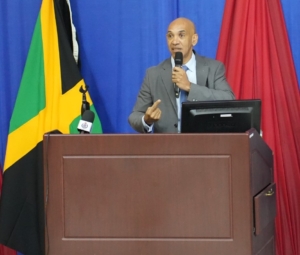In a pivotal address to the National Police College of Jamaica (NPCJ) under the theme; “Ten Years of Excellence & Resilience: Embracing Growth, Inspiring and Shaping Futures”, Police Commissioner Major General Antony Anderson unveiled a bold vision for the future – an approach that prioritizes quality over quantity in shaping the next generation of police officers. The theme resonates not only with NPCJ’s commitment to unprecedented growth but, more importantly, with the discerning eye applied to each recruit who aspires to wear the uniform.
Commissioner Anderson didn’t mince words when he delved into the strategic plan for the force’s growth. He acknowledged the traditional average yearly attrition rate of around 450 officers, emphasizing the need for sustainable growth. “We need to recruit not just for the sake of numbers, but with a clear understanding of what the force demands,” asserted the Commissioner. This stance underscored the need for a more discerning recruitment process, going beyond mere quotas to ensure that each officer contributes effectively to the force’s mission.
The Commissioner’s address echoed a sentiment that has been central to his leadership philosophy – the belief that policing is not just a profession but a responsibility that demands a specific attitude and maturity. He emphasized, “Policing should be hard to get into and easy to leave, not due to discouragement but due to the high standards we set.” This principle is rooted in the recognition of the power bestowed upon police officers and the necessity for a meticulous selection process.
One of the Commissioner’s main concerns lies in the attitude of potential recruits. He urged the NPCJ staff to be vigilant gatekeepers, ensuring that those who don the uniform exhibit the right mindset. “If something strikes you as odd, how is it that this person with a five or six CXC can’t read and write? How is that possible?” questioned Commissioner Anderson. This rhetorical question underlined the critical role of NPCJ as the first line of defence against admitting candidates lacking the fundamental skills and attitudes required for effective policing.
In a stern directive to the NPCJ team, Commissioner Anderson made it clear that filtering out unsuitable candidates is not just a suggestion but a mandate. He insisted, “You guys are the filter. If you don’t filter properly, then what comes down becomes very problematic for us.” The Commissioner’s emphasis on the role of NPCJ as a gatekeeper underscores the institution’s responsibility in preserving the integrity and reputation of the Jamaica Constabulary Force.
The Commissioner delved into the complexities of the training process, highlighting that being a police officer is more than just passing exams. He stressed the importance of attitude as the first and most crucial filter, stating, “The first one is going to be their attitude. And that’s going to be very clear. What kind of person do you have in front of you that has the right attitude and temperament to be a police officer? If not, get rid of them. At that point, filter them out.”
This strategic approach not only ensures a higher standard of officers but also addresses the concerns of the public. Commissioner Anderson drew a poignant picture of the repercussions when inadequately trained officers engage with the public. He highlighted the frustration experienced by citizens when dealing with semi-literate officers, emphasizing that the NPCJ’s role as a filter directly impacts public perception and trust in the police force.
In the final analysis, Commissioner Anderson’s address to the NPCJ outlines a transformative vision for the force – one that goes beyond the numerical growth to prioritize the quality of recruits. The Commissioner’s discerning eye and commitment to rigorous standards underscore a profound understanding of the responsibilities and challenges inherent in effective policing. By filtering out unsuitable candidates, NPCJ stands as a guardian of the force’s reputation, ensuring that each recruit is not just an addition but a valuable asset in safeguarding communities and upholding the principles of justice and professionalism.







